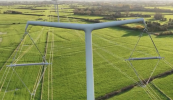joebassman
Member
What are people's view of the pylons that are planned to be erected through East Anglia by the national grid to supply London?
Some of the pylons would go through the farm across the road from where I live, which the farmer is none to pleased about as they would go right behind his house.
Would an offshore alternative, that some are proposing, be a viable option?
Is the plan likely to happen?
I read that 13 MPs are opposing the planned construction of the pylons.
Some of the pylons would go through the farm across the road from where I live, which the farmer is none to pleased about as they would go right behind his house.
Would an offshore alternative, that some are proposing, be a viable option?
Is the plan likely to happen?
I read that 13 MPs are opposing the planned construction of the pylons.



